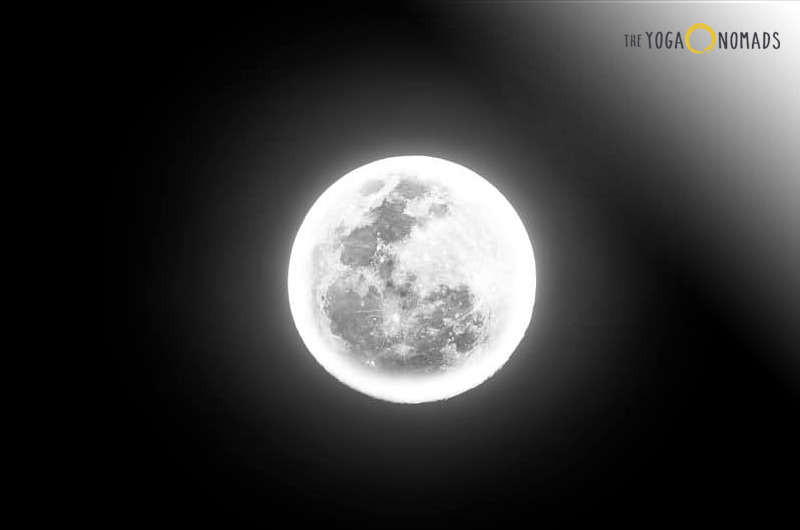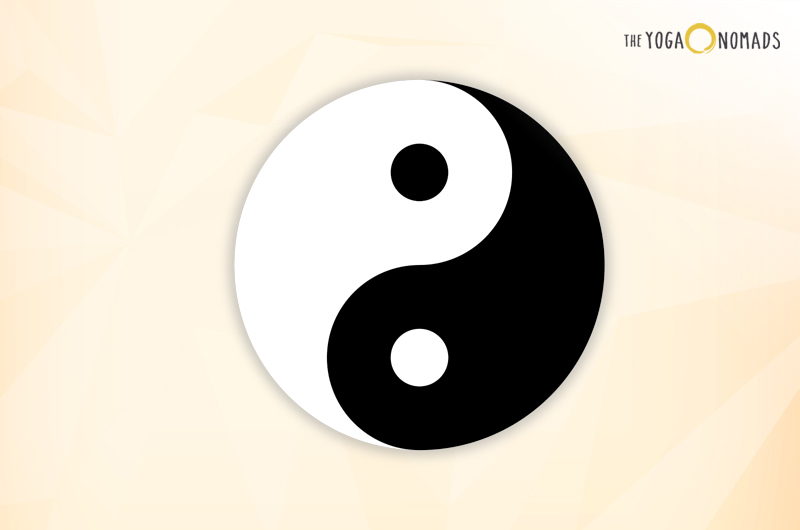Quick Tip: Yin is neither good nor bad; it is essential for balance with yang.
Yin and yang is a concept that most people have heard of before, whether in yoga, Tai Chi, or something else. However, because these contrasting energies are known to be two opposites, people naturally assume one must be better.
One common question people ask is, “is yin good or bad?” The confusion comes from some of the yin characteristics that may seem undesirable. However, when you understand the true meaning of yang-yin, you’ll see that yin and yang both have positive and negative qualities.
Moreover, balancing these energies allows you to draw out the good in each. In this state of harmony, neither is bad. Let’s explore this idea in more detail.
What Is The Yin Yang Concept?


The yin-yang concept originates from ancient Chinese philosophy yet plays a crucial role in many other philosophies and cultural practices, including Buddhism, Taoism, and yoga.
Yin and yang are interconnected yet opposite forces existing in nature and the entire universe. Some common examples are night and day, hot and cold, and sleeping and awake. The concept of yin yang is that both forces need each other, as you cannot have one without the other.
In Chinese philosophy, yin is “like the weather and conditions on the shady side of a mountain,” while yang is “like the weather and conditions on the sunny side.” When interconnected, yin and yang become chi (life force), a vital energy current that runs through our bodies, responsible for our circulation, and delivery of nutrients and minerals.
Excess of one can lead to malaise, which is why for centuries, Chinese people have followed practices to create a balance between both energies in their bodies and their environments.
Yin Characteristics


- Feminine
- Passive
- Slow
- Darkness
- Night
- Cold
- Autumn and winter
- Moon
- Black
- Receptive
- Retreating
- Quiet
- Weak
- Flexible
- Internal
- Intuition
- Mental
Although yin is known as feminine, every male will have some yin energy, while every female will have some yang energy.
People with dominant yin energy are typically peaceful, relaxed, easygoing, and introverted. They may have a vibrant imagination, deep thought process, and a solid connection to their intuition. However, they could be more emotional than yang types and may overthink things or hesitate when making decisions.
Yang Characteristics


- Masculine
- Active
- Fast
- Bright/Light
- Day
- Hot
- Spring and summer
- Sun
- White
- Movement
- Advancing
- Loud
- Strong
- Solid
- External
- Logic
- Physical
Studies have shown that yang people are active, extroverted, and ambitious. They may seem like they are also on the go and never tire. They may appear flexible and carefree in their decisions but are more likely to get irritable or stressed than a yin person.
Is Yin Positive Or Negative?


When you compare the characteristics of yin and yang, you might assume yang is better, stronger, or more desirable than yin. For example, yin is seen as slow and passive, while yang is fast and active. Thinking about these energetic qualities in the human body, you may think yin is a negative energy.
However, yin should not be seen as unfavorable as both forces are equally important. For example, yang energy is helpful when you are working towards a deadline or making your way through a long to-do list.
Yang energy gives us the fire, motivation, and determination to get things done, whether it’s in the office, the gym, or managing things in a busy family household.
But having yang energy all the time would not be a positive thing. You would struggle to switch off, feel restless, and have much difficulty sleeping at night. Yang-dominant people tend to continually push themselves further and can become “workaholics.” They may have the belief that rest is for the weak or unnecessary, so they keep going.
This yang-fuelled attitude can be highly damaging to our health. The passive qualities of yin, such as rest and stillness, are essential for keeping our nervous system balanced. If yang energy remains dominant and yin lacks, we’ll eventually burn out and get sick.
The same is true the other way around. Having too much yin energy and not enough yang can result in a constant state of fatigue and tiredness, making it difficult to get anything done.
Therefore, on their own, yin or yang could be harmful, but when balanced, the two forces are always positive. Taoism teaches that disharmony (evil) is due to an imbalance of yin and yang. Thus, you should strive to cultivate a natural order of both energies rather than focusing on just one.
Neither is better than the other, but you may find one energy more beneficial in certain situations or at certain times of the day. Also, both yin and yang have their advantages. For example, yin is more inward-thinking and spiritual. It can help us cultivate a deeper connection to ourselves and the universe. On the other hand, yang allows us to set and achieve our goals and pushes us to follow our dreams.
The Meaning Behind The Yin And Yang Symbol


The misconception that yin is bad may come from a misinterpretation of the symbol. The yin-yang symbol shows two halves of a circle, one black, and one white. The white/light side represents yang, and the black/dark side represents yin.
However, if you look closely, you’ll see the symbol reveals the true meaning of yin and yang; that they are not complete opposites but complementary forces. Nothing can be 100% yin or 100% yang because they are relative to each other. Everything in the universe contains components of both, just with different ratios.
This is shown in the yang-yin symbol through the inner dots. In the black half of the circle, there is a small white dot, and in the white half, there is a black dot. This shows that there can never be one without the other and is related to the belief that evil cannot exist without goodness. However, in Taoism, both yin and yang are good, with neither representing evil.
Another way the relationship between yin and yang is symbolized is through the curved lines. Rather than a straight line separating the two energies, a curved line shows their interaction as they merge.
Many people like to wear the yang-yin symbol as jewelry to remind themselves of the importance of balancing the two forces. There are many beautiful pendants and bracelets, like this one from Moo & Lee. Along with the yin-yang symbol, it has the Chinese characters of a blessing from the Taoism Supreme Lord and an ancient spell to exorcise all evil from the spirit world.
Yin and Yang in Ancient Chinese Medicine
The concept of yin and yang in Ancient Chinese Medicine is truly intriguing. According to this traditional system, these dual energies play a vital role in diagnosing and treating ailments. Yin embodies the body’s functions related to cooling, nourishing, and moistening, while yang symbolizes warmth, activity, and vigor.
A harmonious balance between yin and yang is essential for good health. Any imbalance can lead to a range of health issues. For example, an excess of yin may manifest as symptoms like cold extremities, fatigue, and a sluggish metabolism. Conversely, an abundance of yang can cause symptoms such as fever, inflammation, and restlessness.
Ancient Chinese Medicine practitioners employ various approaches to restore equilibrium. Common treatments include acupuncture, herbal medicine, and dietary modifications. Acupuncture works by targeting specific points on the body to harmonize the energy flow. Herbal remedies are customized to either enhance yin or yang based on the individual’s requirements.
Exploring the concepts of yin and yang in Ancient Chinese Medicine can provide valuable insights into maintaining overall well-being. It underscores the significance of balance not only in physical health but also in emotional and mental wellness.
The Importance of Yin in Understanding Emotional Intelligence
When we talk about yin and yang, the focus is usually on finding a balance in our physical and energetic aspects. However, the role of yin in emotional intelligence is often overlooked.
Yin’s Influence on Emotional Awareness
Yin energy encourages self-reflection and self-awareness, helping us gain a deeper understanding of our emotions. By embracing yin qualities, we can become more attuned to our feelings and identify emotional patterns. This increased awareness serves as a foundation for developing emotional intelligence.
Yin’s Contribution to Empathy
Empathy is another key component of emotional intelligence where yin energy shines. The receptive nature of yin allows us to listen attentively and connect empathetically with others. This connection enables us to comprehend and share the emotions of those around us, fostering strong relationships and effective communication.
Yin’s Role in Emotional Regulation
Yin energy also supports emotional regulation by providing a sense of calmness and tranquility that aids in managing stress and anxiety. When we embrace our yin side, we can approach emotional challenges with a clear and balanced mindset, facilitating thoughtful decision-making and promoting mental well-being.
Practical Implementations
Engaging in activities such as meditation, journaling and mindful breathing that incorporate yin principles can enhance emotional intelligence by encouraging introspection and maintaining emotional equilibrium.
Incorporating yin into our everyday routines can enhance our emotional health and connections with others.
To put it simply, yin energy goes beyond just maintaining physical equilibrium. It holds a key role in nurturing emotional intelligence. Embracing yin enables us to elevate our emotional sensitivity, compassion, and self-control, paving the way for a harmonious and satisfying existence.
The Vital Role of Yang in Boosting Productivity
When discussing productivity, the concept of yang energy plays a crucial role in driving action and achieving goals efficiently. The dynamic and assertive nature of yang motivates people to start tasks, stay focused, and persevere through obstacles, promoting a proactive approach to work and life.
Boosting Initiative and Goal Attainment
Yang energy sparks initiative, empowering individuals to establish clear goals and take decisive steps toward achieving them. This proactive mindset ensures that tasks are handled promptly and effectively, leading to increased productivity levels.
Encouraging Motivation and Resilience
Embracing yang principles fosters motivation and resilience, crucial for overcoming challenges and maintaining progress toward objectives. The inherent drive of yang motivates individuals to remain dedicated to their tasks even in challenging situations.
Supporting Effective Time Management
Yang Energy supports effective time management by promoting prioritization and structured planning. This organized approach ensures that efforts are directed towards tasks that contribute most significantly to overall productivity and goal achievement.
Utilizing Yang for Innovation and Problem Solving
Incorporating yang qualities encourages innovative thinking and efficient problem-solving abilities. By facing challenges with enthusiasm and creativity, individuals can discover inventive solutions while enhancing productivity through continual growth and adaptation.
Final Thoughts On The Meaning Of The Yin and Yang Symbol
Although they are two opposite forces, yin and yang do not relate to the concept of good and evil. On the contrary, nature shows us that yin and yang cannot exist without each other. Their interaction strengthens their positive qualities, bringing everything into perfect balance.
If you’re interested in diving deeper into this philosophy, I highly recommend reading the book Yinyang by Robin R. Wang.
Pop quiz! 🧘🤔
Yin energy is always negative.
Both yin and yang energies are necessary for balance.
Yang energy is associated with the moon.
Thanks for your feedback!


